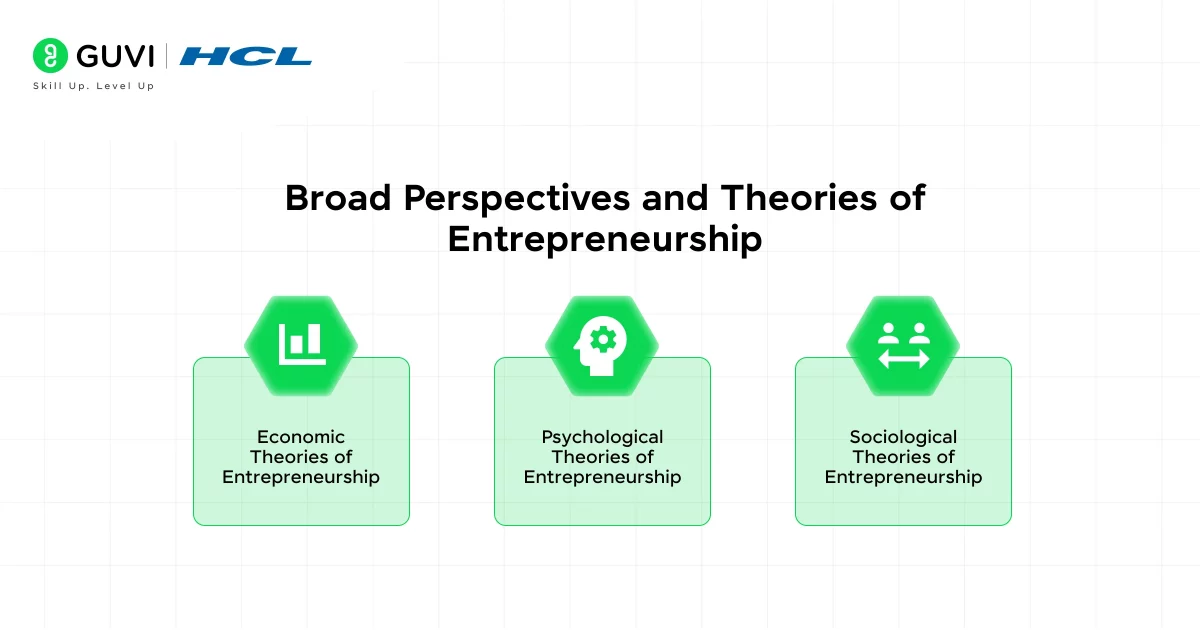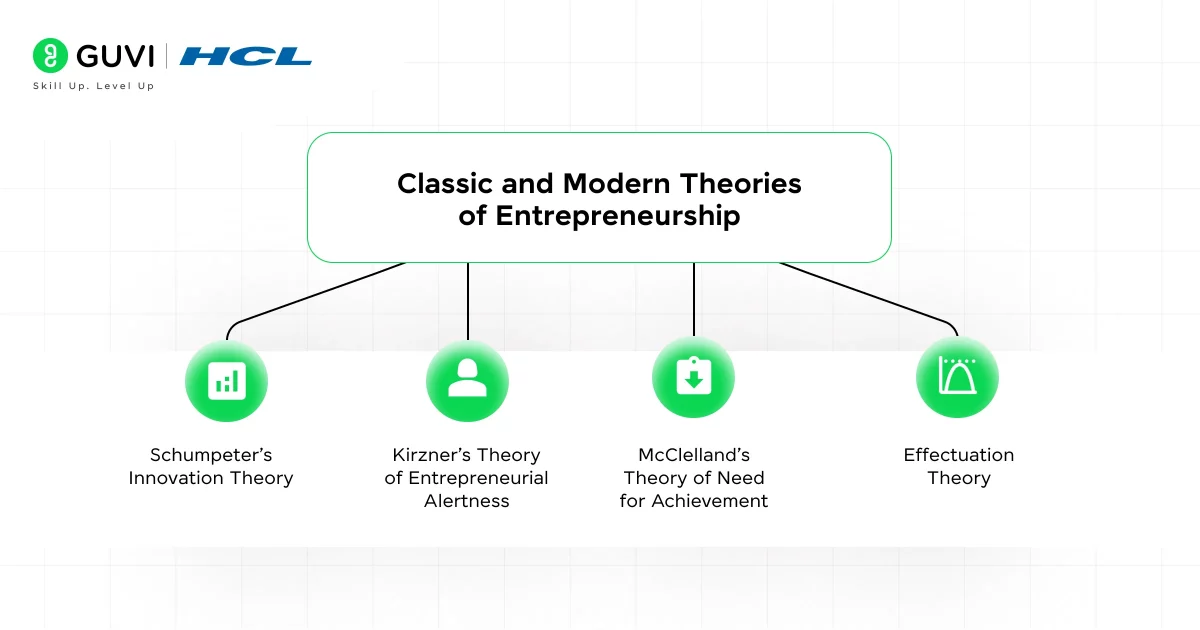
Theories of Entrepreneurship: A Beginner’s Guide To Business
Oct 08, 2025 5 Min Read 3042 Views
(Last Updated)
What truly drives someone to become an entrepreneur, an idea, an instinct, or the environment around them? While startup success stories often spotlight products and profits, the real story behind every venture is the entrepreneur’s mindset and motivation.
Understanding why people take the leap into entrepreneurship and how they do it has led to the development of several powerful theories of entrepreneurship over time. These theories don’t just explain behavior; they help you discover what kind of entrepreneur you might be and how to navigate your path.
Let’s explore the key frameworks and theories of entrepreneurship that have shaped our understanding of businesses today. So, without further ado, let us get started!
Table of contents
- What is Entrepreneurship?
- Why Theories of Entrepreneurship Matter?
- Broad Perspectives and Theories of Entrepreneurship
- Economic Theories of Entrepreneurship
- Psychological Theories of Entrepreneurship
- Sociological Theories of Entrepreneurship
- Classic and Modern Theories of Entrepreneurship
- Schumpeter’s Innovation Theory
- Kirzner’s Theory of Entrepreneurial Alertness
- McClelland’s Theory of Need for Achievement
- Effectuation Theory
- Reflective Challenge: Which Theory Resonates with You?
- Conclusion
- FAQs
- What are the main types of entrepreneurship theories?
- Who first coined the term “entrepreneur”?
- What is Schumpeter’s theory of entrepreneurship?
- What is McClelland’s need for achievement theory?
- What does Kirzner’s entrepreneurial alertness theory mean?
What is Entrepreneurship?

- Entrepreneurship is the act of creating, developing, and managing a new business venture to generate a profit while assuming financial and personal risk. It involves identifying a gap or opportunity in the market, developing an innovative solution, and building a business around that idea.
- Entrepreneurs play a crucial role in driving economic growth, generating employment, and introducing innovations that can transform industries or even society.
- Entrepreneurship isn’t limited to launching startups; it also includes social ventures, small businesses, and even entrepreneurial behavior within larger organizations (intrapreneurship).
- Successful entrepreneurs often combine creativity, strategic thinking, and resilience to navigate uncertainty and deliver value to customers and stakeholders.
Why Theories of Entrepreneurship Matter?
Entrepreneurship isn’t just about startups and viral products – it’s also a field of study. Theories of entrepreneurship are frameworks that help us understand why people start businesses and how they succeed.
You might wonder why we need such theories if entrepreneurial stories are everywhere. Theories give us language and structure to learn from those stories. They reveal patterns in why ideas take off, what motivates entrepreneurs, and how environments shape success.
When you explore theories of entrepreneurship, you’re diving into insights from economists, psychologists, sociologists, and business thinkers. Each theory highlights a different part of the journey.
Understanding these theories gives you tools to reflect on your own goals and decisions. You can ask yourself: Am I driven by a problem I want to solve, a goal I want to achieve, or an opportunity I spotted first? Thinking in these terms can guide how you approach a venture, from finding a market gap to setting your strategy.
Broad Perspectives and Theories of Entrepreneurship

There are several ways in which you can interpret entrepreneurship, and to help you navigate correctly, we have compiled the broad perspectives on entrepreneurship:
Economic Theories of Entrepreneurship
The key factors that construct economic theories of entrepreneurship are:
- Entrepreneurs are seen as key drivers of market activity and economic growth.
- These theories focus on profit-making and efficient resource coordination.
- Entrepreneurs identify gaps between supply and demand and step in to fill them.
- They willingly take on financial and strategic risks to seize opportunities.
- Good economic conditions (e.g., access to capital, technology, infrastructure) foster more entrepreneurial activity.
- Theories suggest you should follow where the money flows—solving problems that make both impact and economic sense.
Suggested Read: Top 9 Types of Entrepreneurship
Psychological Theories of Entrepreneurship
Psychological perspectives zoom in on the individual. Psychological theories center on the individual’s mindset, traits, and motivations. It states:
- Entrepreneurship is often driven by ambition, personality, and behavior.
For example, psychologist David McClelland introduced the idea of a “need for achievement.” Many entrepreneurs have a strong desire to accomplish challenging goals and get feedback on their progress. If you find yourself constantly setting tough targets and feeling energized by achieving them, McClelland would say you have high “n-ach,” a classic trait in entrepreneurs.
- Other common entrepreneurial traits include:
- Risk-taking
- Self-confidence
- Internal locus of control (believing you control your success)
- Risk-taking
These theories encourage you to look inward: What kind of person are you? The answers can reveal whether you naturally have the hunger and persistence often needed to start something new.
Sociological Theories of Entrepreneurship
Sociological theories focus on your environment. They argue that entrepreneurship happens within a social context.
- These theories focus on the social and cultural environment around an entrepreneur.
- Entrepreneurship doesn’t happen in isolation—it’s influenced by:
- Family background (e.g., growing up around businesses)
- Cultural values (e.g., valuing independence or creativity)
- Mentorship and social networks
- Geographic factors (e.g., startup ecosystems, tech hubs)
- Support systems such as business associations, incubators, or local policy can greatly influence entrepreneurial activity.
- Sociological theories emphasize the importance of your community, culture, and connections in shaping your entrepreneurial journey.
Also Read: What is Digital Entrepreneurship? A Simple Guide
Classic and Modern Theories of Entrepreneurship

Now let’s explore some famous theories of entrepreneurship — some older (classical) and some newer (modern). Each gives a unique lens on entrepreneurship:
Schumpeter’s Innovation Theory
Joseph Schumpeter, a renowned economist of the early 20th century, viewed entrepreneurs as the true disruptors of economic growth. Schumpeter’s Innovation Theory highlights that entrepreneurs don’t just participate in markets; they revolutionize them by introducing innovations that replace outdated systems. He called this process “creative destruction.”
Key ideas from Schumpeter’s theory:
- Entrepreneurs drive change through innovation, not imitation.
- Innovations can be:
- New products or services
- New production methods
- New market creation
- New sources of supply
- The focus is on doing something radically new, rather than improving the old.
If you thrive on big ideas and bold changes, Schumpeter’s lens encourages you to seek out opportunities that reshape industries rather than just compete within them.
Kirzner’s Theory of Entrepreneurial Alertness
In contrast to Schumpeter’s bold innovation model, Israel Kirzner offered a more subtle but equally powerful idea: entrepreneurs succeed not by disrupting, but by noticing. According to Kirzner’s Theory of Entrepreneurial Alertness, entrepreneurs are characterized by their “alertness” to opportunities, especially those that others miss.
Core elements of Kirzner’s theory:
- Entrepreneurs don’t need to invent; they need to observe and act.
- They capitalize on:
- Price gaps (e.g., buy low, sell high – classic arbitrage)
- Service gaps (e.g., unmet demand in specific locations)
- Timing mismatches (e.g., delayed access to resources)
- The emphasis is on market equilibrium; entrepreneurs help bring balance by noticing imbalances.
If you’re someone who loves noticing patterns, inefficiencies, or small opportunities in everyday life, then Kirzner’s approach will feel very natural to you.
McClelland’s Theory of Need for Achievement
Returning to a psychological perspective, David McClelland proposed that entrepreneurship is largely fueled by a person’s internal need for achievement, commonly referred to as n-ach. He found that individuals with high n-ach are consistently goal-oriented and seek feedback to improve.
Traits of high-n-ach entrepreneurs:
- Prefer tasks with moderate risk and clear outcomes
- They are driven by personal achievement, not just rewards
- Constantly set challenging but achievable goals
- Seek continuous feedback to improve and grow
McClelland also observed that societies encouraging achievement-oriented behavior often have higher entrepreneurial activity. This theory is especially useful for reflecting on your internal motivations, the “why” behind your entrepreneurial journey.
Effectuation Theory
Effectuation is a modern entrepreneurial theory developed by Saras Sarasvathy. It flips the usual script: instead of predicting the future, entrepreneurs create it through smart action. Expert founders start with what they have and shape outcomes step by step.
Effectuation relies on several key principles. See which fits you:
- Bird-in-Hand (Means): Start with who you are and what you know. For example, what skills, experience, or contacts do you already have to launch a venture?
- Affordable Loss: Invest only what you can afford to lose. Focus on how much time or money you can safely risk, rather than chasing maximum profit.
- Crazy-Quilt (Partnerships): Involve others early. Seek partners or early customers who can contribute resources or support, building a network around your idea.
- Lemonade (Embrace Surprises): Use unexpected events to your advantage. When plans change or problems arise, ask how you can turn that surprise into a positive opportunity.
- Pilot-in-the-Plane: Act like the pilot of your venture. You shape the outcome with your actions, steering your project forward instead of just waiting for the future.
These ideas encourage flexibility and resourcefulness. Effectuation resonates if you’re comfortable with uncertainty and enjoy making the most of what you have. It’s a hands-on, make-it-happen approach.
Explore: Entrepreneurship Projects: Ideas, Types, and Getting Started
Reflective Challenge: Which Theory Resonates with You?

Think about your approach. Entrepreneurship isn’t one-size-fits-all, and neither are these theories. Which ideas feel closest to your instincts and experiences? Consider:
- When tackling goals, do big, disruptive ideas inspire you, or do you get a thrill from overcoming steady challenges?
- Are you more likely to plan every detail upfront, or to start with what you have and adapt as you go?
- Do you constantly scan your surroundings for hidden opportunities, or does your background and network play a bigger role?
Write down which theory (or parts of several theories) feels most like your style. Maybe you’re a mix – that’s common. The important part is discovering which strengths and mindsets you bring. That self-awareness will guide you as you move forward.
If you want to learn more about Entrepreneurship, along with a set of Full-stack skills, as you might know, a website is very essential for entrepreneurs these days, then consider enrolling in HCL GUVI’s Entrepreneurship Course that is a unique blend of skills training to enhance your expertise and capabilities in numerous areas, also strengthening your entrepreneurial attitude & skillset.
Conclusion
In conclusion, theories of entrepreneurship give you different lenses to see your journey. There’s no single perfect model – real entrepreneurs often blend ideas from many theories. Think about which ones resonated with you.
For example, if innovation theory appeals, focus on creative ideas; if alertness speaks to you, stay vigilant to market gaps; if achievement drive fits, set ambitious milestones; if effectuation suits you, keep experimenting with what you have.
Use these theories as tools, not strict rules. Reflect on each idea as you build your venture. Over time, you’ll refine your own approach – a unique mix that fits your strengths, context, and vision. Remember: entrepreneurship is as much about who you are as what you do. Keep learning, stay curious, and trust that the ideas that resonate with you can help light the way on your path.
FAQs
1. What are the main types of entrepreneurship theories?
Entrepreneurship theories generally fall into broad categories: economic, psychological, sociological, and innovation-based frameworks. Each category offers a different lens—from market opportunity and personal traits to social context and disruptive ideas.
2. Who first coined the term “entrepreneur”?
The term “entrepreneur” dates back to the early 1800s and was first introduced in English by Jean‑Baptiste Say, a French economist. He defined entrepreneurs as individuals who “undertake” new ventures and bear risks.
3. What is Schumpeter’s theory of entrepreneurship?
Joseph Schumpeter described entrepreneurs as agents of “creative destruction,” driving change by introducing innovations that disrupt existing market structures. His work emphasized entrepreneurship as the engine of economic development.
4. What is McClelland’s need for achievement theory?
David McClelland proposed that a high need for achievement (n‑ach) is a core character trait of entrepreneurs. Those with high n‑ach set challenging goals, seek feedback, and find fulfilment through accomplishment.
5. What does Kirzner’s entrepreneurial alertness theory mean?
Israel Kirzner’s theory centers on the idea of “alertness”—the ability to spot unnoticed opportunities in the market. He emphasized that entrepreneurship often involves discovering and responding to these market gaps.




































Did you enjoy this article?